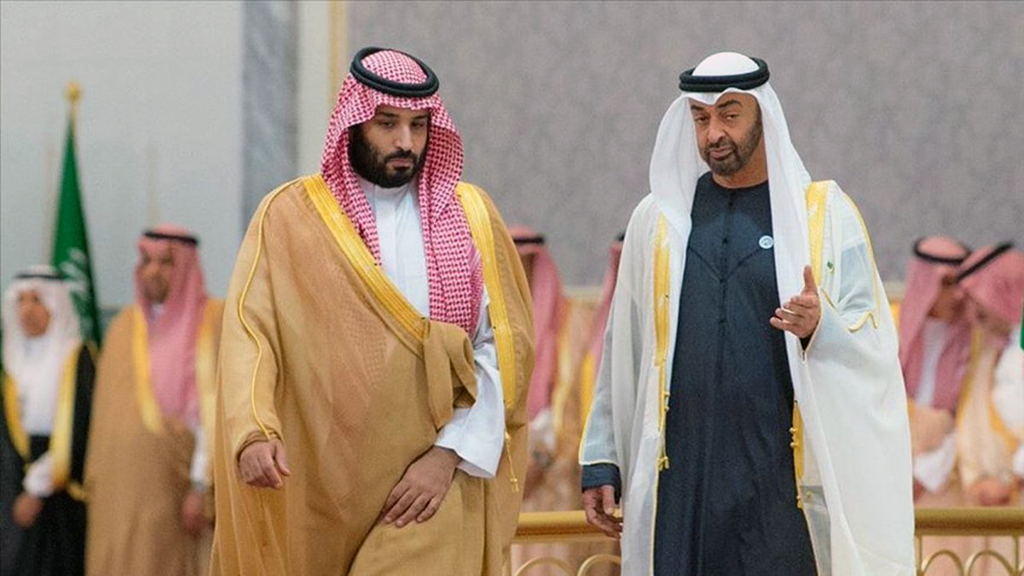[Daily Sabah, 14 September 2019]

A crumbling alliance in the Middle East
President Donald Trump's administration in Washington explicitly supported this ambitious alliance, which portrayed itself as the new powerhouse to reshape the Middle East and North Africa (MENA) region. Saudi Arabia's Crown Prince Mohammed bin Salman (MBS) and the Crown Prince of the Emirate of Abu Dhabi, Muhammed bin Zayed (MBZ), were the leading figures and sponsors of this project.
Share
A little more than two years ago, the most powerful actors in the Gulf Cooperation Council (GCC), namely Saudi Arabia and the United Arab Emirates (UAE), cooperated with Egypt to form a new alliance in the region.
President Donald Trump's administration in Washington explicitly supported this ambitious alliance, which portrayed itself as the new powerhouse to reshape the Middle East and North Africa (MENA) region. Saudi Arabia's Crown Prince Mohammed bin Salman (MBS) and the Crown Prince of the Emirate of Abu Dhabi, Muhammed bin Zayed (MBZ), were the leading figures and sponsors of this project. Egypt was considered the military might behind this alliance, together with Saudi Arabia and the UAE's financial sponsorship.
Trump's senior adviser and son-in-law Jared Kushner, Kushner's team in Washington and the right-wing Israel lobby were also the critical minds behind this new alliance.
The weaknesses of Iraq and Lebanon, economic difficulties in Jordan, and fragmented governments and civil wars in Syria, Libya and Yemen were considered opportunities to implement new effort to reshape the entire region. Conditions looked convenient for the main actors to actualize the idea of creating hegemony in the MENA region.
This alliance perceived Iran, Turkey and Qatar as the most important obstacles to creating this region-wide hegemony. The main message in this new order was "either you are with the U.S., or you are against the U.S."
This alliance even unrealistically imagined forming a NATO-style military alliance of Arab nations. The coalition got involved in proxy wars in Libya and Yemen. They tried to get involved in regime change processes in Tunisia, Algeria and Sudan. Egypt's example and the Abdel-Fattah el-Sissi regime was a great success story for the objectives of this alliance.
They wanted to spread versions of Egypt's counter-revolutionary experience across the entire region.
The masterminds of this alliance were against Iran's expansionism, and they supported the idea of suppressing Shiite influence across the entire region.
Another target was the Muslim Brotherhood.
They considered Qatar and Turkey fundamental support bases for the Muslim Brotherhood. They targeted Shiites, Islamists and moderate democratic actors. Both Shiites and Islamists are genuine local actors rooted in the region, and their significance does not come from the outside support of regional actors. Indeed, external attacks and threats bring them together and lead to their further politicization.
Rather than preferring a divide-and-conquer strategy, the alliance unrealistically started an aggressive fight in the entire region. They did not refrain from targeting Turkey and Iran, Shiites and Islamists, democratic institutions and press freedom at the same time.
They expected to gain the support of Western capitals, think tanks, policy institutions, universities and the press with generous financial rewards and PR campaigns. The ambitions of this alliance were beyond their capacity.
The alliance also had some unrealistic expectations from the Trump administration as well. In reality, they even failed to gain sufficient military support from el-Sissi's Egypt, despite their investments and sponsorship of the Egyptian economy since the coup that toppled the democratically elected Mohammed Morsi. Support from some American neoconservative circles and actors affiliated with the extreme right Israeli lobby provided some advantages to this alliance in Washington and some other Western capitals.
However, this alliance's goals contradicted core Western liberal values. Washington and European powers were not sympathetic to Islamists in the region, and the fierce and incompetent suppression of moderate Islamist actors in Yemen, Libya and Egypt did not generate sympathy for the alliance in Western capitals either.
Efforts to contain moderate Islamist actors and democratic forces further paved the way for radical actors. The brutal murder of Saudi journalist Jamal Khashoggi was one of the most unacceptable steps, which undermined the credibility of MBS, who was one of the key figures of this alliance.
The weakness of the "either you are with us or against us" discourse was epitomized with the failure of the Qatar blockade. Qatar maintained its political position as an actor outside of this coalition and managed to overcome the blockade and containment with the support of Turkey. Military failures in Yemen and Libya also demonstrated the incompetence of this alliance in military affairs.
The alliance has seen little success in terms of instituting an order compatible with its plan. They only destabilized the region further by fueling proxy wars and deepening sectarian and ideological rifts in the region.
As this ambitious project starts to crumble, the rift between Saudi Arabia and the UAE is also becoming more visible. Priority for Saudi Arabia is to contain the "Iranian threat" whereas for the UAE, the main threat is the Muslim Brotherhood and the other moderate Islamist actors in the region.
Even within the UAE, the Abu Dhabi and Dubai emirates have contradicted their priorities. Dubai is concerned with the consequences of military confrontation with Iran, which is portrayed as the fundamental enemy of the coalition, and Turkey is considered the second target of the alliance.
Efforts to maintain this crumbling alliance and its ambitious agenda will be costly for the entire region. It is time for both the main actors of the coalition and their supporters to reconsider this dysfunctional alliance and promote a more inclusive and less antagonistic vision for the region.
Tags »
Related Articles






